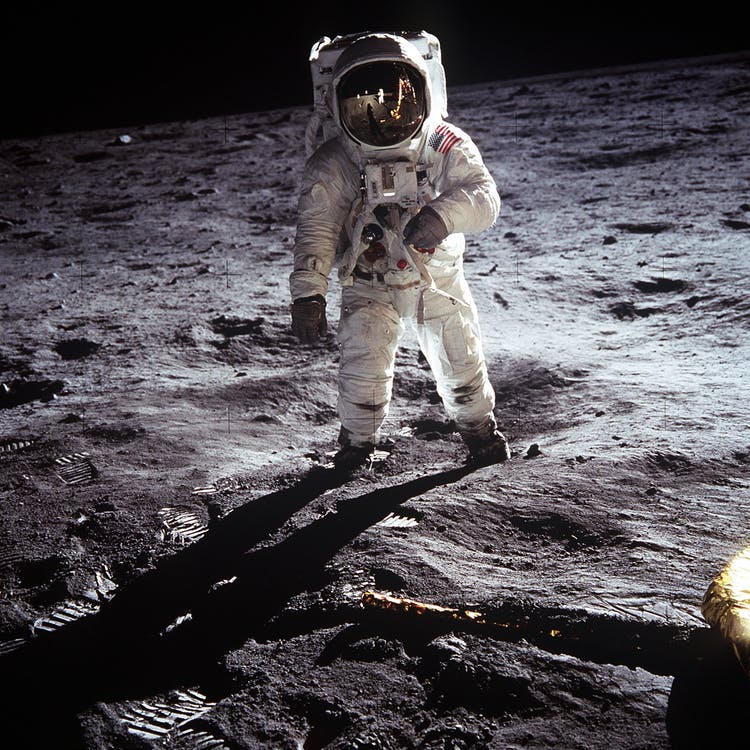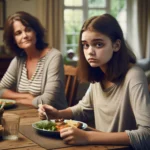Astronauts, ice cream and eating disorders

Astronauts, ice cream and eating disorders
Fifty years ago, Man landed on the Moon. As an 18-year-old exchange student studying in the United States at the time, my memory is vivid of this historic moment. My memory is not so much of the grey, grainy, ghostlike outline of men in white spacesuits stepping gingerly out to a lunar landing, but of sitting on a carpeted floor in a small lounge room of somebody’s home in Washington DC, with about 12 other exchange students and several American friends.
Our eyes are drawn to the small black-and-white television set standing on four legs in the corner of the room. At the same time, our hands are dipping into a large tub of vanilla ice cream placed on the floor in the centre of the room, with us circled around it. Without cutlery, we vote unanimously to use our fingers to scoop up the fast-melting treat, and lick as fast as we can.
The international sharing of the ice cream by young people from at least 10 different countries, made watching this space experience all the more meaningful. We were filled with a strong sense of unity, togetherness, connection, and oneness. We also were filled with the optimistic conviction that if man can land on the moon, then anything is possible. Within the next two weeks, our year in the United States was over and we all returned to our homes around the world, bonded forever by our shared experience of a moment in time.
How far have we travelled since July 1969?
How far have we come in the field of eating disorders in the past 50 years?
In some ways, we have come a long way. Last week, for instance, we read that DNA samples gathered from 17,000 people worldwide have helped scientists to identify the first eight genetic loci associated with the eating disorder, anorexia nervosa. The international study, led by principal investigator and Professor at the University of North Carolina School of Medicine in the United States and Karolinska Institutet in Sweden, Cynthia M. Bulik, reveals that the origins of anorexia nervosa appear to be both metabolic and psychiatric. More research is required but hopes are high that the research findings will influence treatment in years to come.
In 1969, genetics was nowhere near being considered as a cause for an eating disorder, if indeed a cause was thought about at all.
The message in the ice cream
The reason I remember the ice cream so vividly is because, for that moment in time, my eating disorder gave a moment’s respite. For a moment, I was free to share a great moment with the young people around me. I was free to put my fingers in that ice cream and scoop a mouthful of the soft delicacy. I was free to join in. To fully share that moment. For that moment, ED took a back seat and issued a reprieve. That’s why I remember the ice cream.
Interestingly, the ice cream was not mentioned in my journal that night. I write that we had staged our Talent Show and “then we split up into groups and went to different homes to watch the historic first step of Man upon the Moon — Neil Armstrong – gee, it is so incredible…to think of them way up there…I wonder if it will become a common thing to go to the moon one day…probably so….”.
Probably I wanted to guard that ice cream experience, in which I was granted freedom to be carefree like my peers, and live totally in that precious moment, even from my journal. Most likely I wanted to simply cherish that moment and file it in my memory bank forever.
Writing about it might have been triggering – for instance, how many calories were in that ice cream? How much exercise would I have to do, to compensate? At that time, and for many years hence, my eating disorder dominated my journal-writing as it did me, with endless guilt-laden rules and regulations.
Fifty years on, eating disorders are in the light
Fifty years on, I am releasing and sharing that precious guilt-free ice cream memory for the first time. I am grateful to the American astronauts for landing on the moon, because they helped me to see that with passion and perseverance, great things can be achieved. We must never give up!
Fifty years ago, my eating disorder was a terrible, shame-filled secret that I kept locked within myself. I’m sure some of the lovely families I stayed with during my year in America wondered and worried about my eating, my moods, and other behaviors but nobody said anything. If they had, I would have denied anything was wrong, for the shame ran deep inside and out. Within I felt I must be a very weak person because I could not ‘control’ myself. In the outer world, I felt very ashamed, turning down kind offers of beautiful food from warm-hearted mothers in whose homes I was billeted on the end-of-year trip. I felt those mothers must have thought me so rude and unappreciative. I would like to apologise to them all and to explain, all these years on, that “I had an eating disorder!”
Talking about eating disorders reduces the secrecy and shame
Fifty years on, we ARE talking openly about eating disorders and this makes me exceedingly glad. At the weekend, I met with my children’s dad, George, and two of our three granddaughters, aged nine and seven, for lunch, prior to seeing a local performance of ‘The Sound of Music’.
We were sitting at an outdoor table enjoying the warmth of the winter sun, waiting for our meal to be served. The girls began talking about seeing ‘Grandma on the TV news’, several nights before, and George began to ask more about the research and genetic breakthrough. I had the news clip on my cell phone and the girls, together with their grandfather, clustered eagerly around to watch it one more time.
For me, this shared family moment equals that of watching man walk on the moon. My grandchildren’s generation is growing up in an environment in which eating disorders are no longer in the dark but in the light. My grandchildren know that their family is united in looking out for them. They know that an eating disorder is not a weakness but an illness.
Isn’t it wonderful that we as a family can talk openly about eating disorders at our meal table? No shame, no secrecy, no stigma. We have indeed come a long way. Take that, ED!





